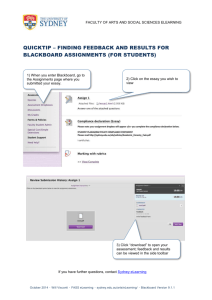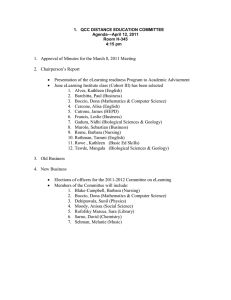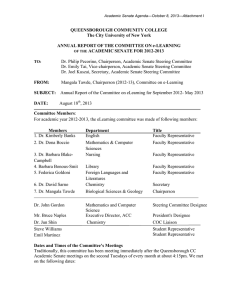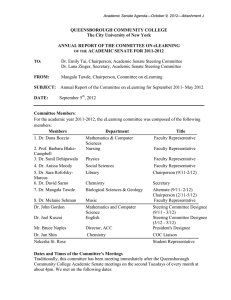QCC C L
advertisement
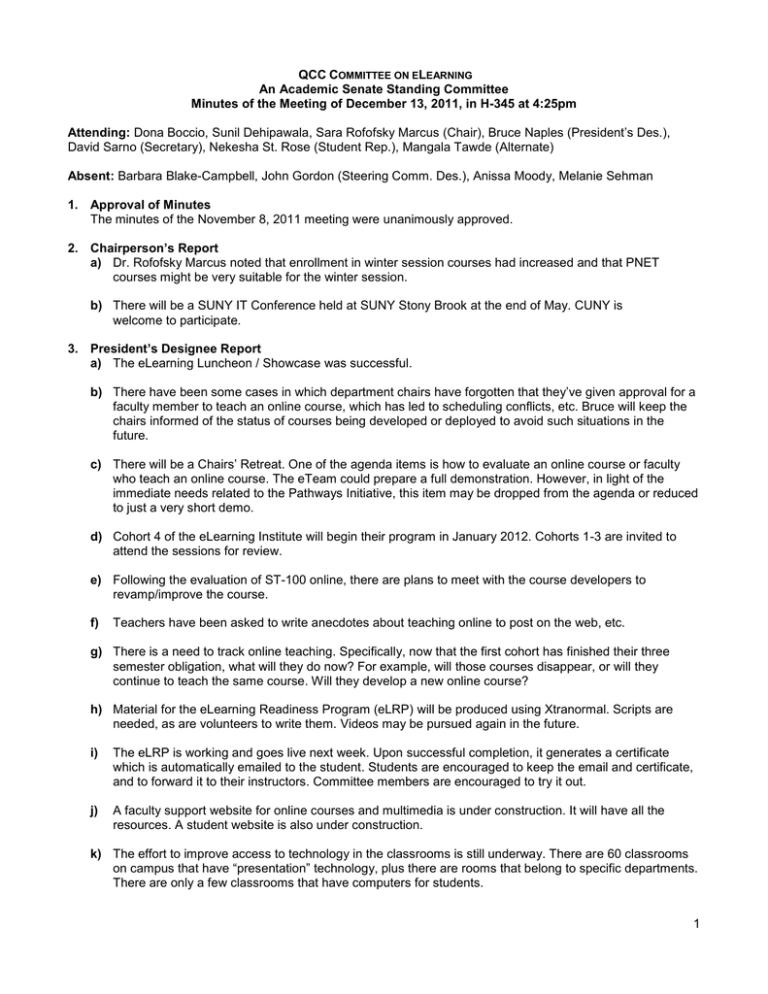
QCC COMMITTEE ON ELEARNING An Academic Senate Standing Committee Minutes of the Meeting of December 13, 2011, in H-345 at 4:25pm Attending: Dona Boccio, Sunil Dehipawala, Sara Rofofsky Marcus (Chair), Bruce Naples (President’s Des.), David Sarno (Secretary), Nekesha St. Rose (Student Rep.), Mangala Tawde (Alternate) Absent: Barbara Blake-Campbell, John Gordon (Steering Comm. Des.), Anissa Moody, Melanie Sehman 1. Approval of Minutes The minutes of the November 8, 2011 meeting were unanimously approved. 2. Chairperson’s Report a) Dr. Rofofsky Marcus noted that enrollment in winter session courses had increased and that PNET courses might be very suitable for the winter session. b) There will be a SUNY IT Conference held at SUNY Stony Brook at the end of May. CUNY is welcome to participate. 3. President’s Designee Report a) The eLearning Luncheon / Showcase was successful. b) There have been some cases in which department chairs have forgotten that they’ve given approval for a faculty member to teach an online course, which has led to scheduling conflicts, etc. Bruce will keep the chairs informed of the status of courses being developed or deployed to avoid such situations in the future. c) There will be a Chairs’ Retreat. One of the agenda items is how to evaluate an online course or faculty who teach an online course. The eTeam could prepare a full demonstration. However, in light of the immediate needs related to the Pathways Initiative, this item may be dropped from the agenda or reduced to just a very short demo. d) Cohort 4 of the eLearning Institute will begin their program in January 2012. Cohorts 1-3 are invited to attend the sessions for review. e) Following the evaluation of ST-100 online, there are plans to meet with the course developers to revamp/improve the course. f) Teachers have been asked to write anecdotes about teaching online to post on the web, etc. g) There is a need to track online teaching. Specifically, now that the first cohort has finished their three semester obligation, what will they do now? For example, will those courses disappear, or will they continue to teach the same course. Will they develop a new online course? h) Material for the eLearning Readiness Program (eLRP) will be produced using Xtranormal. Scripts are needed, as are volunteers to write them. Videos may be pursued again in the future. i) The eLRP is working and goes live next week. Upon successful completion, it generates a certificate which is automatically emailed to the student. Students are encouraged to keep the email and certificate, and to forward it to their instructors. Committee members are encouraged to try it out. j) A faculty support website for online courses and multimedia is under construction. It will have all the resources. A student website is also under construction. k) The effort to improve access to technology in the classrooms is still underway. There are 60 classrooms on campus that have “presentation” technology, plus there are rooms that belong to specific departments. There are only a few classrooms that have computers for students. 1 3. Old Business a) Use of TigerMail There is no written policy that says TigerMail is the official mode of communication with students at QCC. B. Naples notes that most students use TigerMail only when their teacher requires it. Several questions and ideas were posed: What incentives for students to use TigerMail can be publicized? If the eLearning Committee composes a resolution, is there a policy that it could piggyback on, such as the College Policy on Conduct (p.243 of Student Handbook)? In which area of the QCC website would the policy be placed? Could the eLearning Committee submit a joint resolution with the Committee on Computer Resources? M. Tawde will draft a resolution (further work will be carried out via email before the next meeting). She will also contact A. Traver, Chair of the Committee on Computer Resources. S. Rofofsky-Marcus, will contact E. Tai for guidance. b) Permissions for registering students in online courses The eLearning Committee has learned that A. Flamholz (Physics) may be using a unique system to control registration in his online course. The committee is unclear on how he is able to do this. On what basis are students allowed to register (e.g. completion of eLRP)? Are students being chosen? Are students being denied entry? It is not clear if this was just a proposal or if it is actually in use. S. Dehipawala will talk to A. Flamholz to get more information. Another method for registration was discussed. Could registration in FNET/PNET courses be blocked until the eLRP is completed? For example, a pop-up window could inform the students that registration cannot be completed until the eLRP is taken and the certificate is sent to the instructor. The instructor could then send the permission number to the Registrar. The advantage is that the student would not have to check email in order to be informed of this. The disadvantage is that not all instructors will want to manage all of this. In response, it was also suggested that such a system could be used at the option of the teacher. c) Blackboard-focused short workshops Ideas for workshops were proposed. How to develop discussion forums in Blackboard How to use Gradebook features. Best practices for posting documents to Blackboard or for making them printer-ready. d) Assessment S. Rofofsky-Marcus will prepare a report for the Academic Senate that includes our remarks on assessment of online courses. 4. New Business a) Blackboard 9 Blackboard 9.1 will be available in summer 2012. Expect tutorials (not in-house) and workshops (created in-house). b) CUNY Wide ePortfolio Conference Similar to the CUNY IT Conference, this event is under development for March 2013. The meeting was adjourned at 5:35pm by unanimous decision. Respectfully submitted, David Sarno Secretary, eLearning Committee 2
